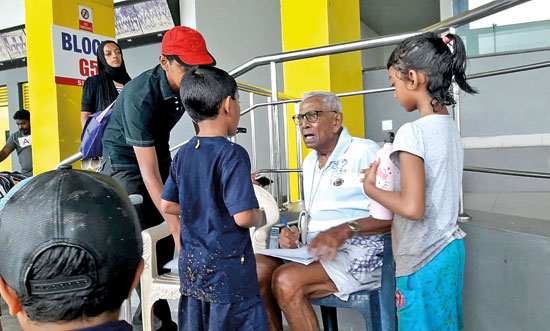Summa’s coaching philosophy
Remembering former Ceylon rugby and athletic star, Summa Navaratnam, who inspired and guided many youngsters, on his 100 birth anniversary
Two philosophies guided one-time Royal College rugby coach Summa Navaratnam throughout his exemplary coaching career. One was his belief in harnessing the innate talent of people. The other was his disgust for and rejection of nepotism.
Wednesday, May 21, was Summa’s 100th birth anniversary. Shortly before he died in 2023, he sat down with us for several candid conversations about his life and career.
“My main idea was to bring out the boys’ capabilities and not to push them into doing what I want,” he said.
“If somebody cannot run, you do not force him to run. Similarly, if he is strong and muscled, you deploy him in the forward pack. In athletics, too, my objective was to try and draw out natural talent. That is basic. You cannot ‘make’ athletes.”

Summa taking attendance of kids in his academy
What if an athlete showed little talent but much ambition? “You can bring him up to a certain level,” Summa said.
“But you can’t take him beyond that. My objective, therefore, was to try and get the maximum but also give leeway. At a certain point, you have to draw a line.”
This was learnt through personal experience and development, Summa points out. “I could reach a certain level but not go beyond that,” he explained.
“If you try to turn someone into something he is not, you’re butting your head against a wall.”
Summa’s revulsion of influence-peddling, while longstanding, was heightened after this exclusion from the 1948 Olympics which is documented in an earlier chapter.
“That is what shaped my thinking, that nepotism must never prevail,” he reiterated.
“And in my coaching I saw to it that it never did. It influenced me in the selection of teams. Both students and parents were aware of my stand. We did not put family or friends before the player and his skills.”
Summa maintained that he took coaching wins and defeats in the same spirit. Still, it was hard not to feel a tinge of regret when in 1967 the Police Sports Club that he was coaching (then an unbeaten side in the ‘B’ Division) lost at the finals by 3 points to Havelock Sports Club, “because the ball rolled over and the referee declared it a kick”. It was doubly crushing as Police were, till then, unbeaten in the ‘B’ Division and had beaten CR&FC (Division ‘A’) at the semi-finals.
“That was my biggest disappointment,” he held. “They could’ve won that match.”
Whilst he coached rugby for most of his life, Summa also trained aspiring athletes for around two years at Royal College. Under his stewardship, they won the Sir John Tarbat Trophy.
Summa’s personal schedule—the one he stuck to—was tough. “Sri Lankans develop muscles slowly,” he explained.
“So I would train around three hours a day, spread over a long period. It takes three or four months of this to reach prime condition. When I was training to Olympic standards, I was at it nearly the whole day. Walking was most important. We also had weight training except that we didn’t have weights so we carried books.”
One of Summa’s enduring mantras, therefore, was: “If your stomach muscles are right, you will be fit forever. The core muscle is key.” That, to him, was the secret of getting fit for any game.
“The idea was to get your speed first, then develop your arm muscles,” he explained.
“We didn’t have weights at the time. So I would concentrate heavily on the stomach muscles and then get back to speed training and fitness. The Swedish mile follows. That was the technique I was taught, the one I followed and the one I implemented for the boys.”
“My own athletic training came in handy,” he concluded. “You have to be fit to run. You have to be fit to play rugby. You don’t run or play rugby to get fit. That was my theory.”
Summa’s sessions for the boys started in the late afternoons (he went to work in the mornings) with a warm-up and progressed to wind sprints, short distance and, finally, walking, jogging and sprinting. If there is one workout that everyone across generations remembers today, it was that last leg: “walking, jogging, sprinting, walking, jogging, sprinting”.
It was called the Swedish mile or, technically, the “fartlek workout”. In Swedish, “fartlek” means “speed play”. The exercise blends continuous (endurance) training with interval (speed) training. It challenges the body to adapt to various speeds, and conditions someone to become faster over longer distances. And unlike intervals, where you stop or walk for recovery, fartlek running is continuous and involves varying your pace throughout the workout.
Summa pushed his charges to their maximum. “If I had a 100m man, I gave him a 200m drill,” he described.
“If I had a 200m man, I gave him a 400m drill. You have to double the distance for training purposes. Ultimately, what you’ve been training for throughout six months is done in 10 seconds. And without developing your muscles and exercising consistently, you can pull a tendon.”
The beauty of Summa’s skill was that it didn’t stem from formal education. He learned it from books, many of which were sent to him by relatives abroad, and from “chaps who came and helped to coach”. One of them was Guy Thiedeman, champion athlete and swimmer who is mentioned in an earlier chapter.
Today, generations of Royalists remember the paces he put them through with gratitude for how it shaped, not only their sporting abilities, but their professional lives.


